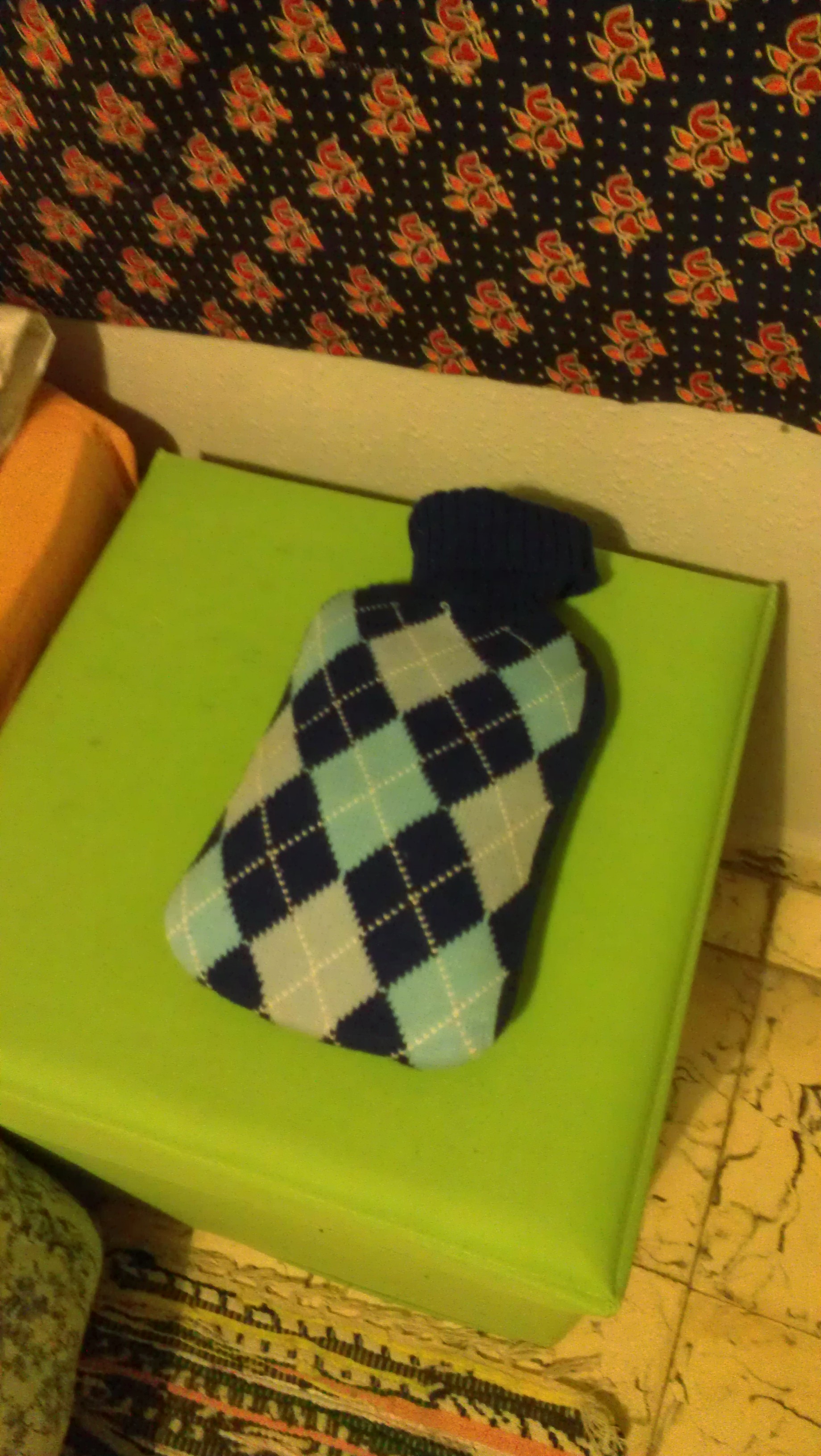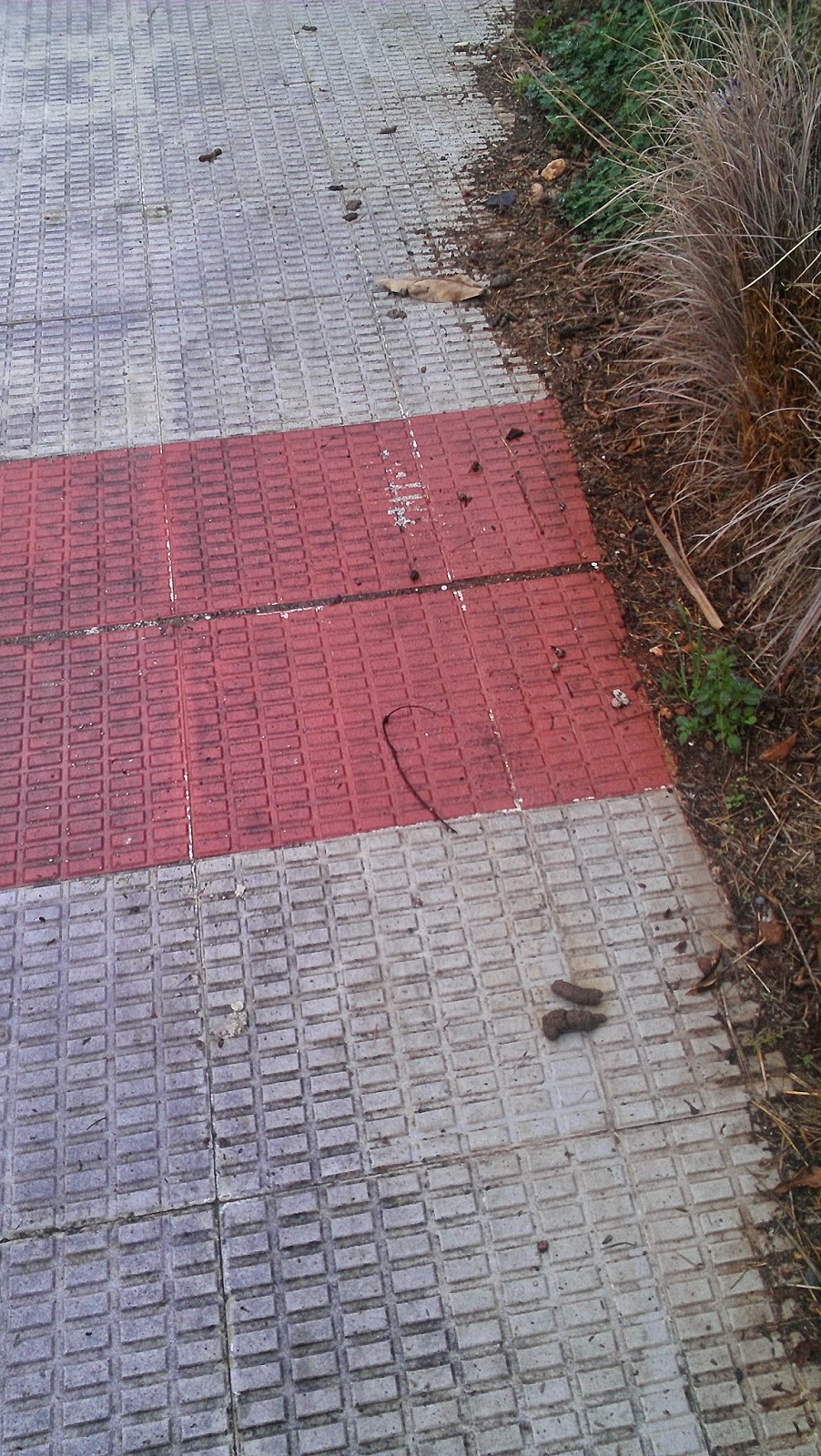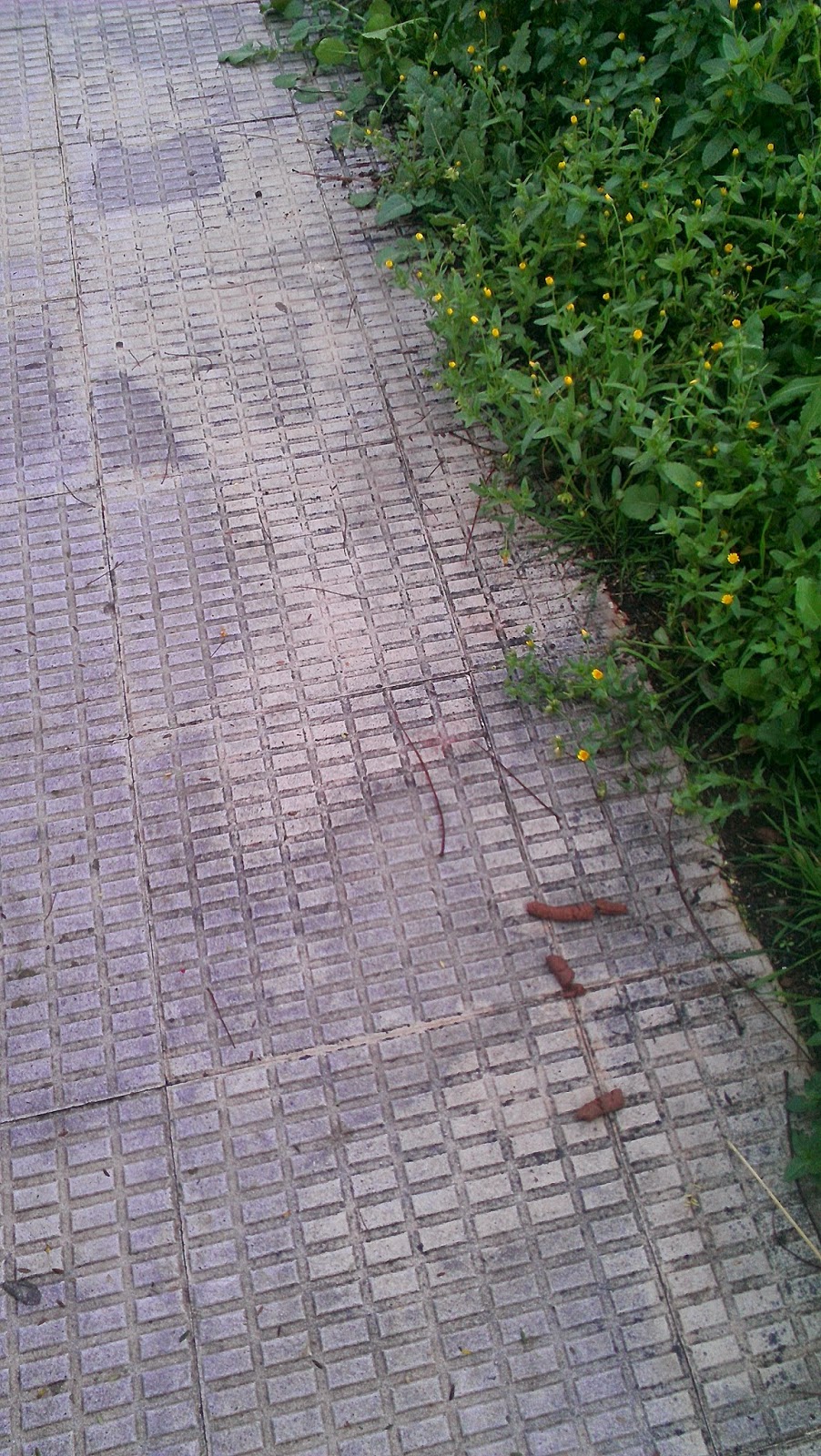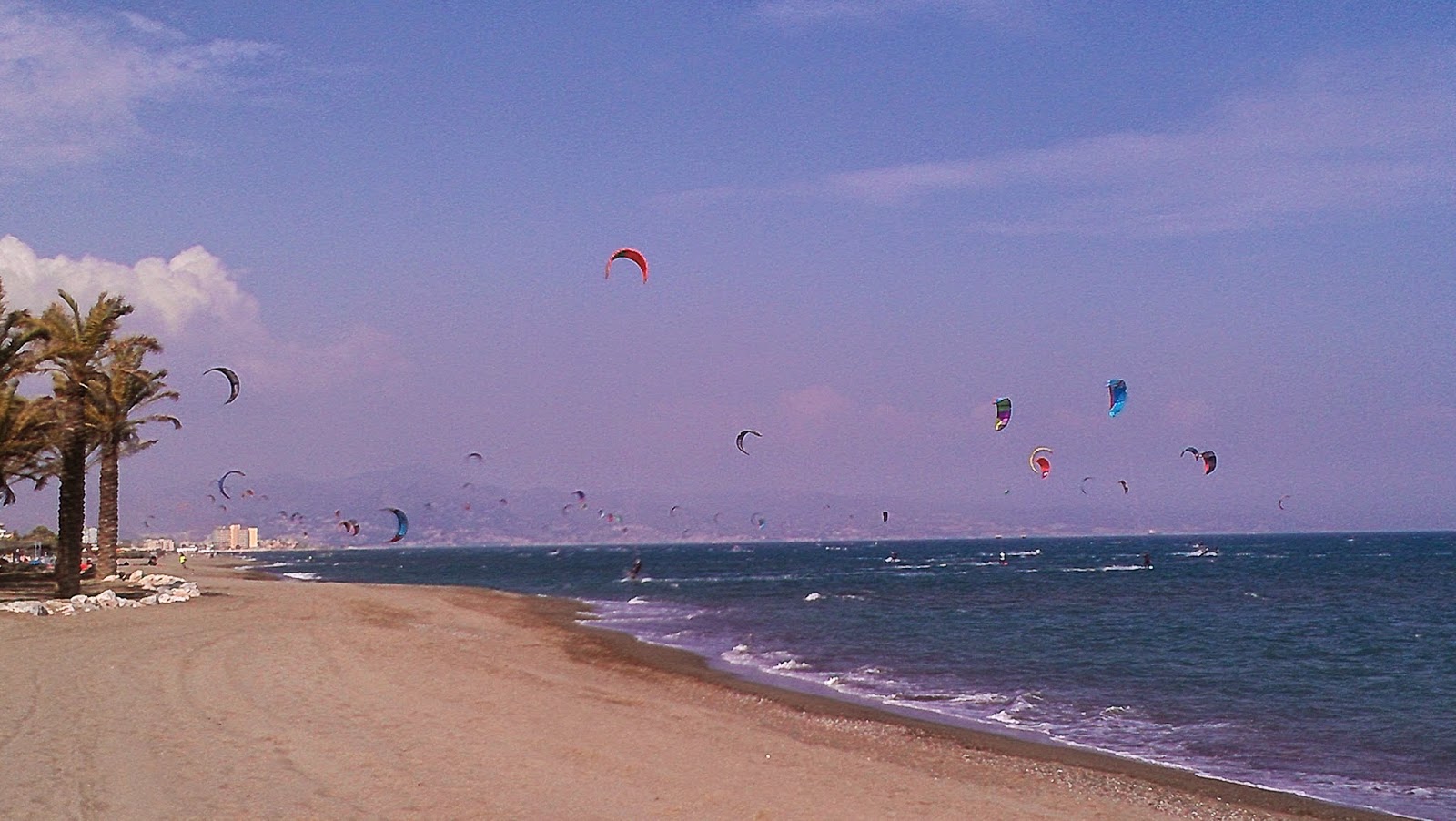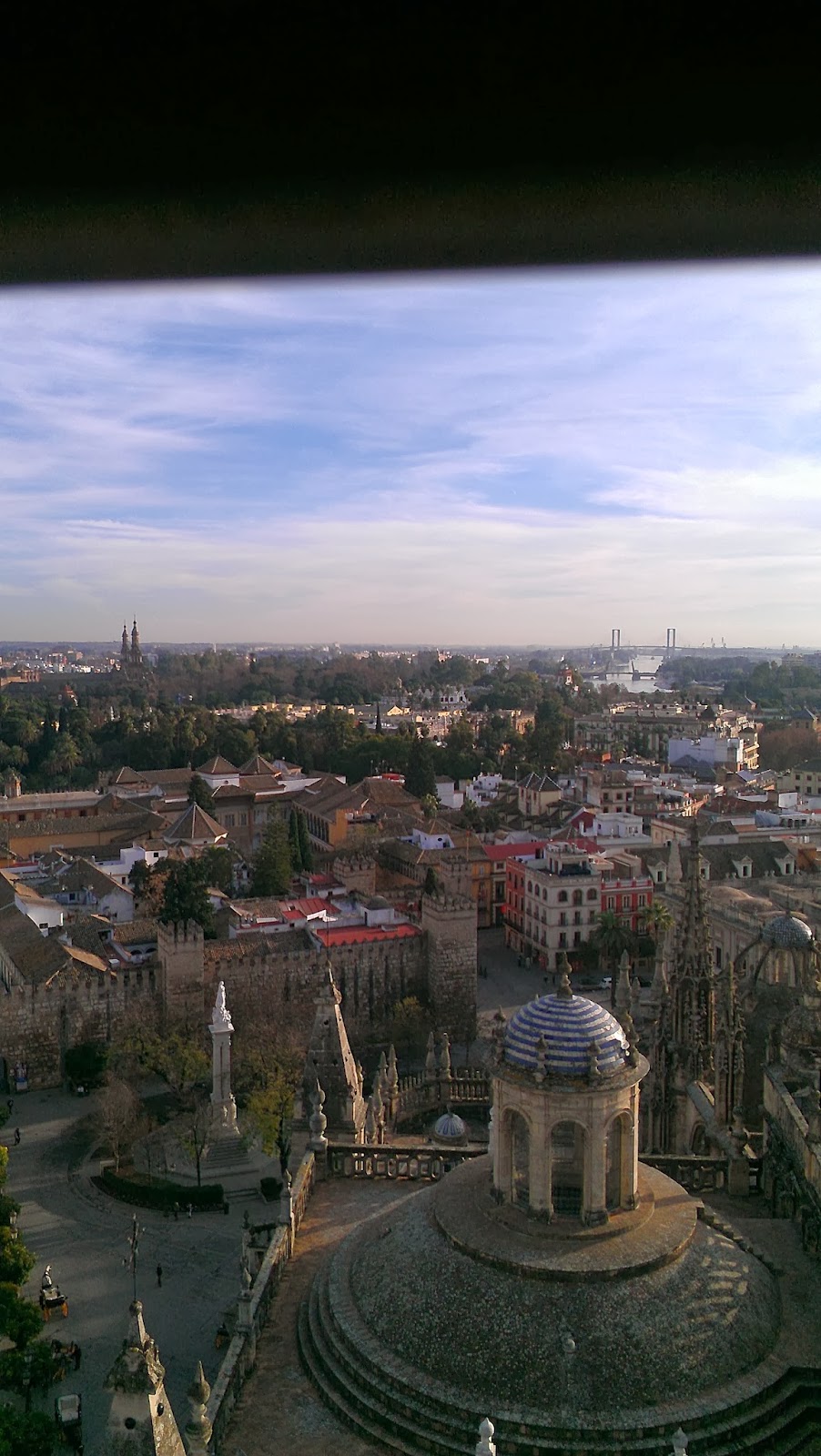Monday
7:45am – Head out the door and down the hill to meet my ride at 7:50. On Monday mornings, I ride to school with Pepe, a biology teacher at IES Vega de Mar in San Pedro de Alcantara. On the 10-minute drive from Marbella, we talk about our weekends and other pleasantries. It’s good practice for both of us. Pepe tries to speak in English, I try to speak in Spanish. Hilarity often ensues.
8:00am – We arrive at school and enter the Sala de Profes (aka, the teacher’s lounge, aka ‘club profe’). After a round of ‘holas’ and ‘buenos’, Pepe and I head straight for our mugs to prep our morning coffee. We take turns treating each other. (Coffee isn’t free for profes. It costs .50€). I sit enjoying my coffee (and if lucky, my take-along breakfast) and listening to the rapid-fire convos between the other profes.
 |
| arriving at school |
8:15am – The bell rings for first period. By now, I am used to the sound of it. Though when I first arrived, I almost had multiple heart attacks, since the bell sounds something like a cross between a fire alarm and an air raid siren. Everyone heads off to their classes. Since I don’t have class this hour, I sit in the lounge and prepare for the day ahead.
9:15am – Time for my first class. History and geography with the 2nd level bilingual students. When I walk into class, several students greet me with a very rehearsed, ‘Hello, Kisha. How are you?” The rest of them are chatting loudly, running around the classroom, or horseplaying with their friends. I have to shout ‘Ready?’ at least 2 or 3 times to get them to settle down. Before getting into today’s lesson, I start off by asking if anybody did anything fun or interesting over the weekend. Many of the students are as eager to share as I am to listen, plus it gives them a chance to practice speaking English in an unstructured way. After everyone has shared, we move on to the lesson. Today, we are reading about daily life in the Middle Ages. I ask for volunteers to read the English handout the profe has selected. Each volunteer first reads a few sentences from the lesson in English, then translates the same into Spanish. We go over unfamiliar vocabulary words as a group, and I answer any questions they may have. The profe, Enrique (aka, Quique), helps out with any Spanish-English translations that I don’t know. Throughout the lesson, I have to stop several times to quiet the class back down or call out a student who is obviously not paying attention.By the end of class, Quique has worked up a sweat and the kids have worked my nerves.
 |
| such adorable little scamps. |
10:15 – First class is over. I head back to the lounge to hang and prep for my next class, which isn’t until 11:35.
11:35 – My second history class. This time with the first-year students. They are quickly becoming my favorite group of the 3 that I work with. They aren’t as boisterous as the 2nd years, but they have way more energy and interest in learning than the 3rd years. However, their level of English is much lower, so it can be a challenge communicating or coming up with in-class activities that they will easily grasp. After the ‘how was your weekend’ chat, we delve into today’s lesson: the government of ancient Rome. Usually we read and translate, but today, I divide the class into several groups. Each must come up with a solution to a problem that the Roman citizenry is facing. They must decide which members of the government they need to work with, and propose their own solution to solve the problem. Not surprisingly, one student asks if they have to give their explanation in Spanish or English. I shake my head, smile, and say, “When I’m here. It’s always English. Vale?” Surprisingly, the students really take to the assignment and they come up with some creative, if not entirely practical solutions.It´s a rare moment of success. I relish in my unquestionable auxiliar awesomeness.
12:35pm – Technically, I’m done for the day. But I have an hour of ‘coordination’, which any of the teachers can use to chat with me about lessons for the coming week or any special projects or activities they want me to prepare for the class. It’s rare that anyone does, but I stick around anyway, just in case.
1:45 – 4:00pm – Workday is officially over! Since it’s Monday, I’m headed to do some grocery shopping. I catch the #4 urbano (aka, local / intracity bus) which stops right outside of the school, to Puerto Banus. From there, I catch the #1 urbano to La Cañada, Marbella’s huge shopping mall. By now, I’m starving, so I stop at McDonald’s in the mall for an after-school snack of patatas deluxe and a beer. Total cost: 2.35€. Inside the mall there is also Alcampo, where I prefer to do my shopping. It’s equivalent to a Super Wal-Mart, so I can get groceries and personal / household items all in one stop. I’ve finally gotten into the habit of bringing along my backpack and a large, reusable shopping tote. Plastic shopping bags are usually not free in any store in Spain – checkout clerks almost always ask: “Bolsa quiere?” (“Want a bag?”) instead of just giving you one – so it literally pays to have your own. Also, the backpack helps me transport heavier items on the bus ride and walk home. I try to stick to my 20-25€ weekly grocery budget, but sometimes I go a bit over if I have to buy things like deodorant or lotion.
 |
| la canada – where i do most of my grocery shopping |
4:00pm – I catch the bus from La Canada back to the main bus station in Marbella, a 7-10 minute walk from my house.
4:30 – Home! Time to put up the groceries and rest a bit before making dinner.
7:30 – Time to unwind for the evening. Maybe I’ll stream a movie online, straighten up my room a bit, hang out in front of the TV with my roommates, or just surf the Internet for a few hours before going to bed. Most likely, I’m still recovering from a long, eventful weekend and I could use the rest.
 |
| relaxing after school with purp, the house kitty. |
Tuesday
8:00am – The sunlight streaming in my window wakes me up. It’s my late day, and I don’t have class until 12:45. I pull the covers over my head and half-sleep for an hour or so more.
10:00 – 11:30am – Even though I tell myself I’m going to accomplish a ton of stuff before heading to school, I manage to fritter away time until it’s almost time to catch the noon bus that will just barely get me to school in time for my 12:45 class.
11:45am – 12:45pm – I make the 7-10 minute walk from my house to the main bus station. I catch the noon bus from Marbella to San Pedro. The bus ride takes about 40 minutes and costs 1.23€.
12:45 – 2:45pm – I have PE class with the 2nd year students. I spend the first half of class explaining 2 different playground games that are commonly played in the US. The students take notes and ask questions before trying the games for themselves. The second half of class I spend in the teacher’s lounge correcting an English presentation about basketball that the teacher has prepared for a different class. Next, it’s off to music class with the first year students. I often get the feeling that the music profe doesn’t exactly know what to do with me in class. Today, is no exception. The students take turns reading from the English textbook (today, it’s about the Baroque period), and I ask them questions about what they just read.
 |
| preparing to teach the kids about four square (the analog one) |
 |
| in music class |
 |
| after-school commute / carpool from san pedro to marbella |
Wednesday
7:45am – Off to meet Pepe!
8:15am – 9:15am – On Wednesdays, I alternate between music and PE classes. Today, it’s PE class with the 3rd year students. I read the presentation on basketball in English, and the profe translates as needed into Spanish. The students make notes about the rules, players, and key vocabulary related to the sport. Apparently they will be tested on this later.
9:15am – 10:15am – English class with my favorite teacher in the school – Mila, the bilingual coordinator. The students’ behavior is markedly different in her class. They are quiet, respectful, and attentive, even though I have to work a little to get their energy level up. Today, we discuss adjectives. I write various adjectives on the board and call on students to guess what they mean. Afterwards, I ask the students to write down 3 adjectives that describe themselves, and we go around sharing all the answers. There are some creative and some downright hilarious responses. This is one of the few classes where I truly get to engage with the students, and I think they enjoy the interaction as much as I do.
10:15 – 11:35am – No class until later, so I lounge in the sala de profes, chatting with some of the teachers, or prepping for tomorrow’s classes.
 |
| The bilingual teachers have a meeting in club Profe. From L to R: Enrique (Quique), Luis, Paco Serrano, Meritxell, Mila. |
11:35am – 12:35pm – PE with the first years. A listening exercise for today. I read a text about juggling, which explains the history of the sport and some different methods, using simple English terms. After I finish the reading I ask the students prepared questions based on the text to assess their level of listening comprehension.
12:35 – 1:35pm – Done for the day! I make the 15-20 minute walk down the street, across a ravine, up a hill, across an overpass, and along the side of the highway to catch my bus. On the ride home, I study my Spanish dictionary, read, or make notes about today’s class.
 |
| after-school commute – crossing the ravine |
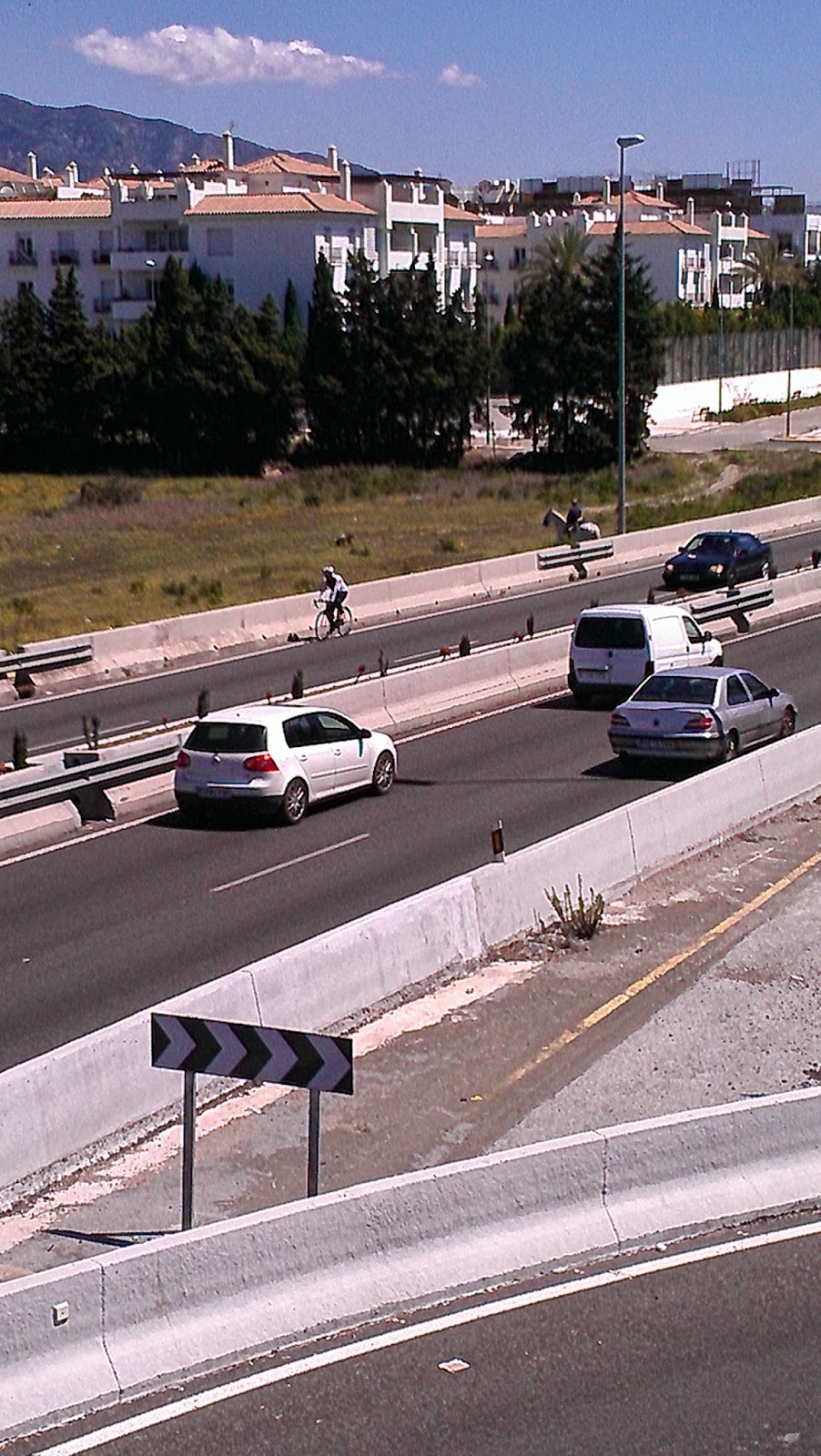 |
| after-school commute – on the overpass |
Thursday
11:30am – It’s Friday! Well, at least for me. It’s my last day of classes for the week. I arrive at the school just in time for my first of 2 math classes.
11:35am – 1:45pm – Back-to-back math classes with the 1st and 2nd year students. I already hate math. So having to ‘teach’ it in English to non-English speakers is not exactly my favorite activity. The profe usually has me work with the students using a prepared handout of exercises. I explain the instructions in English and help the students use English to read the equations and explain their solutions. Most of the time, it goes well, but there are some differences in the way math is done/taught in Spain (commas instead of decimals, methods for division, etc.) that leave me scratching my head. The math profe usually reverts to speaking completely in Spanish (an absolute no-no in my other classes) before the end of the class, so am I often left smiling and pointing like a mute game show host while secretly counting the seconds until class is over. Did I mention that I hate math?
 |
| but when it’s one of the students’ birthday, they do this – which makes math less awful. |
1:45 – 2:45pm – History and geography with the 3rd year students. A cool class since the students are older, and we often get into some pretty deep conversations. Today’s topic: globalization. I lead the students in a brief discussion on how we have all been impacted by globalization. I ask them for examples of music, food, clothing, and TV programs that they like but are not from Spain. Then we do some reading and translation, and finally finish with a video that I found on the topic. The students give a huge round of applause after the video, and I spend the last few minutes of class having them share their opinions on why they think globalization is good or bad. When the bell rings, I get the feeling that all of us are sad that class is over.
Well, maybe not too sad.


